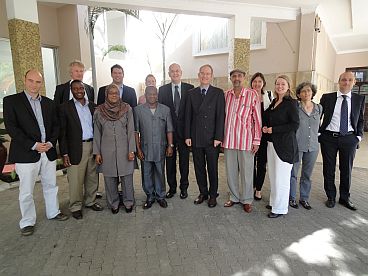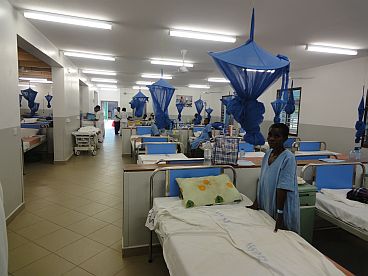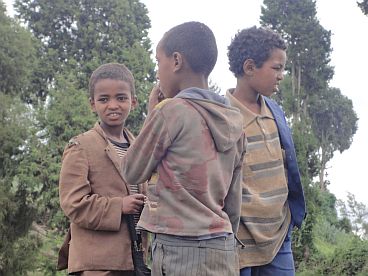SP Member of Parliament Jasper van Dijk reports on a working visit to Tanzania and Ethiopia
SP Member of Parliament Jasper van Dijk reports on a working visit to Tanzania and Ethiopia
From 17th-25th August Members of the Parliamentary Committee on Foreign Trade and Development Cooperation paid a visit to Tanzania and Ethiopia. The main question they wanted to address was whether the government is right to put more emphasis on trade than on development cooperation, a line established by the previous cabinet and continued under the current minister responsible for these policy areas, Labour’s Lilianne Ploumen. The policy is coupled with deep cuts in spending on development cooperation: from 2010 onwards the annual budget was reduced by €2 billion, from around €5 billion to €3 billion.

The Dutch parliamentary delegation in Ethiopia. The SP’s Jasper van Dijk is on the far left of the picture.
In both Tanzania and Ethiopia we visited numerous Dutch firms who are particularly active there in agriculture and horticulture, producing flowers, potatoes, seeds and other crops. They profit from low prices, cheap labour and a favourable climate. There are, however, also disadvantages: lack of transparency in regulation, corruption, poor infrastructure and the low level of schooling amongst the workers, which forcefully underlines the need for investment in education.
The Dutch government is trying to aid these businesses by means of a range of incentive measures, which are extended on condition that the support is ‘relevant to development’. This means that the companies in question must make efforts to involve the local community in their work and to operate in a sustainable fashion. This has its ups and downs but is a crucial point if you want to prevent firms from making use of cheap labour in order to make high profits from which the developing country sees no return. This goes also for the phenomenon known as landgrabbing, where the authorities chase people off their land in order to settle commercial concerns on it. So it’s a source of additional distress if such a process is financed via moneys intended for development.
Simply dishing out money in order to establish a business as quickly as possible doesn’t therefore achieve much. That nevertheless appears to be what the government is aiming for when it comes to the new ‘growth fund’, from which firms can access €750 million in loans. Without independent oversight and clear criteria regarding sustainable development, this will quickly come down to a hidden export subsidy.
There’s nothing wrong with encouraging sustainable trade, but as long as massive poverty and inequality persists, development aid will remain just as important. When countries can stand on their own two feet, aid can be phased out. This requires time and above all fair trade rather than free trade, because while rich countries remain so much stronger economically than poor countries, and there is therefore no question of a level playing field, it’s important that developing countries be given the chance to develop. That means putting a stop to unfair trade agreements, high import tariffs, agricultural subsidies, dumping and tax evasion. Ten times the amount of money still leaves Africa as arrives there, and on that point the Dutch government still has a world to win.
This was also demonstrated by our visit to the African Union in Ethiopia, where the Commissioner for Trade expressed strong criticisms of the European Partnership Agreements (EPAs). EPAs require developing countries to open their markets to the European Union to the tune of 80%, making protection of their own markets impossible. The danger of dumping lies in wait, and this will hinder trade among African countries. A Tanzanian MP hit the mark when he said, ‘why do we buy your meat, when you don’t but ours, although you eat it when you’re here?’ Negotiations over the EPAs have now gone on for years.
In addition to businesses and political institutions, we also visited school and hospitals. In Ethiopia’s capital Addis Ababa, we went to a reception centre for prostitutes, financed with Dutch money, while in Dar Es Salaam, Tanzania, we saw a hospital which has been able to expand as a result of Dutch aid. We went into schools offering outstanding education with the assistance of Dutch development NGOs.

During the trip it became clear to me that the government’s policy is tilted towards the promotion of Dutch businesses and that this comes at the expense of development cooperation. In my view aid and trade complement each other. Trade’s fine, but won’t put an end to enormous poverty. Development cooperation is also needed, for education, health care and security. If development aid isn’t working, then obviously it must be ended; but if aid clearly contributes to the fight against illiteracy and illness, then the budget for it is money well spent.

Aid must be timely and focused on social and economic progress. Aid extended without conditions is doomed to fail; clear agreements must be made regarding expenditure. Aid given to schools for the fulfilment of the Millennium Development Goal of primary education for all children makes little sense if no lessons are given due to the lack of teachers.
From ‘aid to trade’ means, for this government, ‘from development aid to aid to firms’, which brings me to three points of criticism:
- The risk is great that support to Dutch companies will bring little benefit to developing countries. It would therefore be more honest to finance this support – including the ‘growth fund’ of €750 million – from the economic affairs budget so that it does not come at the expense of development cooperation.
- Investment in trade and cuts in the development cooperation budget will lead to there being less money available for matters such as education and health care, despite the fact that education is the key to development for poor countries.
- As long as the government does nothing about unfair trade with developing countries, these countries’ chances will be limited and there will never be a level playing field. Development Cooperation Minister Lilianne Ploumen should therefore make every effort to address unfair trade agreements, tariff barriers and agricultural subsidies, dumping and tax evasion.
The visit to Ethiopia and Tanzania did not give a complete picture of experience in developing countries, but it was nevertheless informative. Embassies work hard to implement policy; this has its ups and downs, but good things certainly result. All the more reason, in my opinion, to argue in the coming period for a fruitful development policy which is not exclusively aimed at the promotion of Dutch business.
